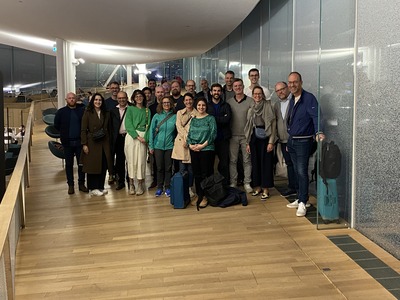The international PHEMS project funded by the EU is focusing on the development of data management and research in pediatric healthcare. It brings together European children’s hospitals and other key stakeholders. The project, led by HUS Helsinki University Hospital, aims to better utilize existing healthcare data and develop new methods for the treatment and research of childhood diseases.
Katariina Gehrmann works as the Director of Digital and Innovation Services for Children’s and Adolescents’ Diseases at HUS and leads the PHEMS project, which started in October 2023. The three-year PHEMS project was granted 7 million euros in funding from the Horizon Europe programme and the UK research funding agency.
Goal: secure usage of patient registry data between hospitals
Katariina explains that the PHEMS project was inspired by the need to develop the use of patient registry data and hospital data lakes in international contexts. The current decentralized or federated data processing model has also stemmed from the same need.
The PHEMS project involves a total of six hospitals from different parts of Europe, including HUS. The hospital partners in the PHEMS consortium are part of the ECHO community (European Children’s Hospital Organization), which advocates for children’s health and their access to the best quality care through the collaborative work of children’s hospitals. Additionally, technical and expert organizations are involved in the project. To enable co-development, the project aims to harmonize data used in the data pools of different hospitals.
The project’s key target is to develop an ecosystem that enables research collaboration and information management by utilizing data from different hospitals in such a way that sensitive information is not transferred from the original location (known as federated learning) and privacy is protected by anonymizing the data. Federated analytics and learning thus create a secure and scalable collaboration model for sharing patient data.
Bringing together experts from six different countries in various fields
The PHEMS project has partners from six different countries including Finland, Latvia, Italy, the Netherlands, the United Kingdom and Spain. The technical implementation of the project involves the CleverHealth Network member company Tietoevry, which focuses on developing federated data infrastructure enabling the work on analytics and machine learning using data from several registries without connecting data to a centralised repository.
Another Finnish company, VEIL.AI, has developed next-generation anonymization technology that produces high-quality anonymous and synthetic data while preserving privacy. When health data is anonymous and of high quality, individual patients cannot be identified from the information, and the same conclusions can be drawn as from traditional research data.
Katariina Gehrmann explains that synthetic data refers to data created based on everyday patient information (Real World Data) that mimics the original data and can be used e.g. in developing algorithms to improve patient care or to test electronic health records. Anonymous data is also beneficial in cross-border research projects when information needs to be transferred. Since anonymous data does not contain identifiable personal information, the EU’s General Data Protection Regulation (GDPR) does not restrict the movement of data.
“The core of the PHEMS project is data collaboration across international borders. VEIL.AI’s technology enables study designs where data-intensive research is conducted with anonymised and synthetic data from multiple countries. The goal is faster access to data, high quality study designs and eventually of course better patient care,” says Tuomo Pentikäinen, CEO of VEIL.AI.
Aiming for a scalable and growing ecosystem
The PHEMS project wanted to focus on pediatrics, as children’s research has traditionally been underrepresented and children’s special needs require particular attention, especially in the case of rare diseases. Sharing patient registry data between different hospitals is especially important for the research and treatment of rare diseases in children.
The project’s three clinical use cases focus on cardiac patients, sepsis, and hemophilia. The project aims to create a sustainable collaboration network that will continue to operate after the project ends. The project also intends to develop a so-called Playbook to provide guidance on data sharing and collaboration between hospitals. The project includes seven work packages, three of which are led by HUS. In addition to Katariina Gehrmann, the project team at HUS includes Technology Officer Pekka Kahri as a work package leader, Development Manager Mikko Juvonen in charge of technical coordination, and Project Manager Marja Vaitinen in charge of project management, as well as several experts in medicine and information management.
Katariina Gehrmann concludes: “This EU project has already shown that high-level expertise can be combined from different countries and sectors, and such close cooperation among different experts is a prerequisite for the success of a multifaceted project. The PHEMS project is an example of how we can take significant steps forward in healthcare through collaboration.”
Head of Data-driven Applications Teemu Ekola from Tietoevry can see the value of the project: ”Data usage in the health sector is challenging due to the sensitivity of the data, and in pediatric care in particular where there is not so much data available. The technology we now develop does have significant potential in the sector related to data management, research and development also from a larger perspective, whether we discuss European collaboration or collaboration based in Finland.”
Hospitals within the PHEMS consortium: HUS Helsinki university hospital (FI), Erasmus Universitair Medisch Centrum Rotterdam (NL), Meyer Children’s Hospital IRCCS (IT), SJD Barcelona Children’s Hospital (ES), Great Ormond Street Hospital for Children in London (United Kingdom), Bērnu klīniskā universitātes slimnīca (LV).
Technology companies within the PHEMS consortium: Tietoevry Finland Oy (FI), Aridhia Informatics Limited (UK) and VEIL.AI Oy (FI). In addition, there are two companies specialised in service design: The Hyve B.V. (NL) and GENESIS Biomed (ES).
More information: https://phems.eu/

